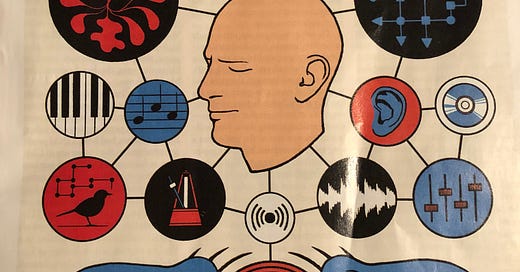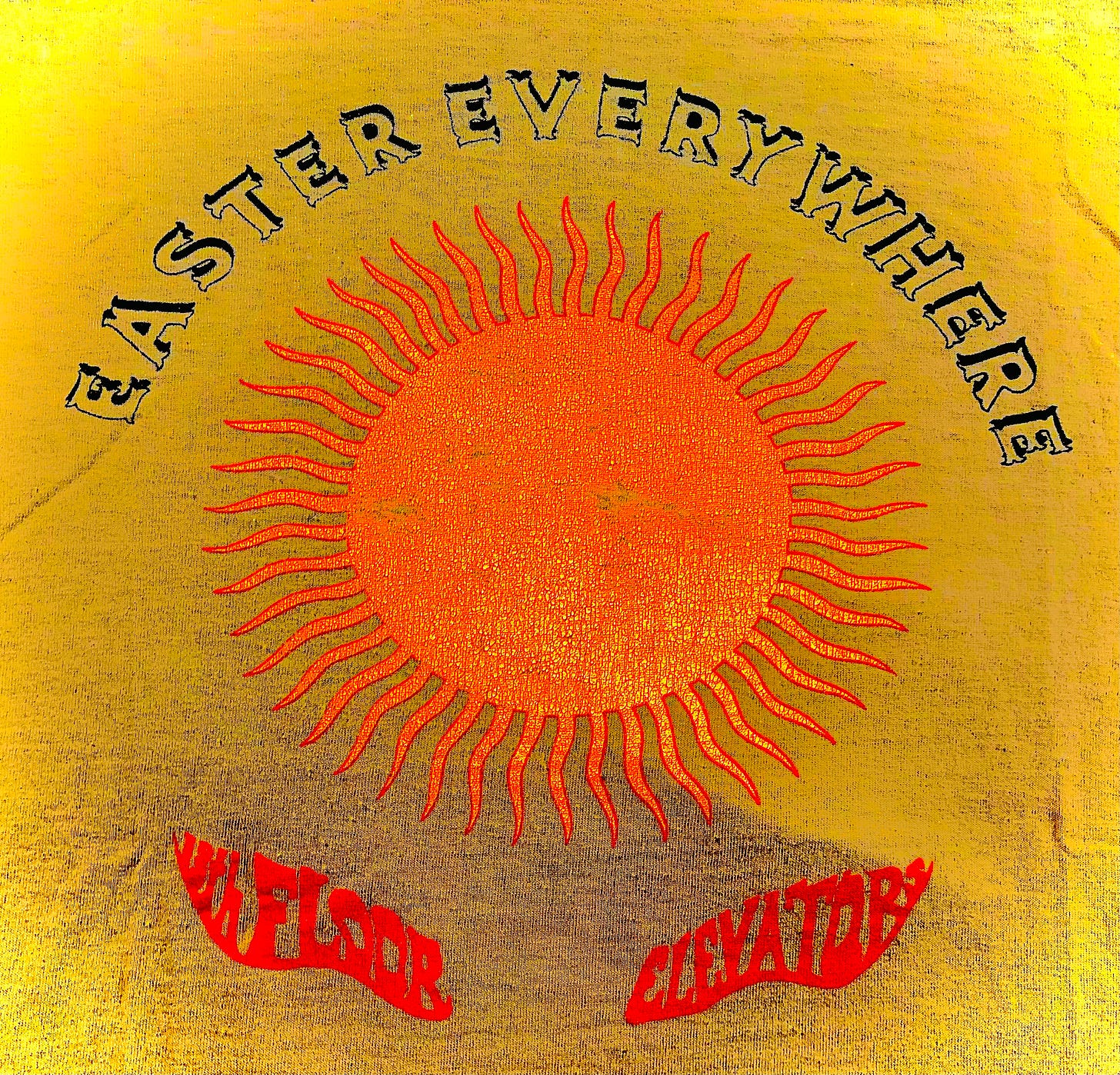“Crossover Artist: A neuroscientist and musician unites his two passions.” The New Yorker.
If I have to choose a spirit animal, it’s Steve Coogan… or the elephant. This article begins with elephants playing music. The animal that practices a form of “religion” (worshipping the dawn, and revering the bones of their dead).
Elephants were the hook, but many other animals play music in this piece (a bonobo jamming with Peter Gabriel, e.g.).
The article is really a profile of the neuroscientist who studies such things, David Sulzer. He’s not your average lab rat. Under the stage-name Dave Soldier, this neuroscientist played rhythm guitar for Bo Diddley, opened for Muddy Waters, and pops up in the company of Lou Reed, Richard Hell, La Monte Young, and William S. Burroughs.
You don’t get more primitive than the music of animals. “Crossover artist” reveals plenty about the primary functions of music across species—storytelling, community-formation, and communication.
It touches on another critical function of music, which sounds like New Age hokum but is as empirical as modern medicine—healing. The article notes music’s ability to recall memories for Alzheimer’s patients and give mobility to Parkinson’s sufferers. It allows one speechless man recovering from a stroke to communicate—by singing. To say nothing of the ultrasound, or sonic treatments that break-up plaque or calcification.
On a personal note, “Crossover Artist” ends with a trip to a field research center, where ecologists study the music of finches, on the outskirts of New York City. The facility is in Millbrook—in a house once owned by the family of a friend—when Timothy Leary conducted his early LSD experiments there in the 1960s.
Music for Lebowski’s Bathtub
I don’t have any whale songs this week—but here’s some music from the world’s second-largest mammal… and some from outer space. This is weird stuff, suitable only for a post-bowling session in the tub. While you’re waiting for someone to return the Dude’s favorite rug.
If this is too out-there for you (trust me, it is), if nothing else, the samples make for good aleatory listening. Plug one of the tracks below into your preferred streaming service and let the algorithm do its creepy thing. It may take you to some interesting places (Ween’s The Mollusk, Saint-Saëns on theremin, the odder corners of Frank Zappa’s oeuvre… depending on your personal history and the whims of our robot overlords.)
The second track features the much-poeticized “music of the spheres”—the sounds of heavenly motion. Astrologer Johannes Kepler, who calculated the planetary ellipses of our solar system in the 17th c., left specific instructions for transcribing the mathematical values of these ellipses into musical frequencies. Several composers have taken Kepler up on this, including Dave Soldier, the neuroscientist mentioned above. Sounds like the soundtrack to 2001, and I have no doubt Stanley Kubrick did his homework in this department. (Note the Doppler effect as planets of various sizes—Jupiter as bass, Mercury as soprano—approach and recede your vantage point, atop the sun.)
Dave Soldier, “Thai Elephant Orchestra”
Dave Soldier, “The Harmonies of the World”
“Carnival of the Animals, XIII. Le Cygne (the Swan),” Camille Saint-Saëns, performed by Clara Rockmore on “The Art of the Theremin.”
I know that’s a lot to digest. The titles of “art music” lack the pithy immediacy of “Stairway to Heaven.” But this is cool—one of the results of plugging “The Elephant Orchestra” into Spotify. Unlike the first two, you might enjoy this one outside the tub. Still—consider it a novelty.
Saint-Saëns was a 19th c. Romantic, whose composition is here reinterpreted for the theremin—an instrument you know best from the Ghostbusters soundtrack or The Song Remains the Same. Known as the world’s most difficult electronic instrument, the theremin works by moving a performer’s hand in the space between two electromagnetic antennae. Jimmy Page wowed audiences into seriously reconsidering all that claptrap about channeling Satan, by affixing one of these instruments to the top of his amplifier and creating ghostly noises with nothing but his fingertips and thin air. Here, a true virtuoso of this strange toy takes it to new heights, somewhere between the human voice and a violin.
“The Homeless Wanderer” by Emahoy Tsegué-Maryam Guébrou.
Another mouthful, and an earful of God. This came up in my aleatory listening as well. This woman has been called The Honky Tonk Nun of Ethiopia, because she lives in a monastery in Addis Ababa and plays somewhere between Debussy and Ornette Coleman. Incredible listening, and a short read on her, here. Unlike the previous tracks, this is beautiful, accessible music under any circumstances. Especially a Sunday morning.
“Rick Rubin Says Trust Your Gut, Not Your Audience,” Honestly with Bari Weiss.
The producer who started Def Jam in his NYU dorm room has been all over the media lately—Rogan, 60 Minutes—but this is a good opportunity to introduce listeners to Bari Weiss’ one-of-a-kind podcast, Honestly.
Weiss founded Honestly, and a Substack newsletter, Common Sense, after she resigned from the New York Times in 2020 over self-censorship and cancelation campaigns. Since then she’s been running circles around the MSM, and made a media company of herself, The Free Press. It all began with this independent podcast.
An eye-opening early episode concerns a Palestinian immigrant in Minneapolis whose business was vandalized and boycotted in the wake of George Floyd’s murder. His daughter was a passionate advocate for the BLM movement at the time, who then found herself canceled, and her family business in ruins, after it emerged that this woman of color had posted offensive material on social media as a clueless fourteen year old. A heartbreaking plea for sanity from an American dreamer and major employer of all colors and creeds—the owner of Holy Land foods.
The Rubin episode is more fun, but it’s interesting to hear the legendary producer discuss cancelation, art and censorship, and other things Anderson Cooper never thought to ask him about.
“A Scandal Is Taking Place This Week In American Music,” Ted Gioia.
The Honest Broker tells the story of folklorist Mack McCormick, an eccentric Houstonian widely regarded as the foremost expert on Robert Johnson—the blues guitarist who gave rock & roll all its Faustian legends about selling one’s soul to the devil, in exchange for preternatural talent.
Includes a link to the backstory of a legendary Houstonian I’d never heard about, Mack McCormick.
These people—Gioia, McCormick, Alan Lomax and their ilk—are the modern version of Dark Age monks, Islamic scholars, or Dante and Petrarch. Preservationists, hell-bent on reviving ‘pagan’ art forms that would otherwise be lost to history. In this case, the devil’s blues.
Selah, and Happy Sunday.
—The Third Ear






